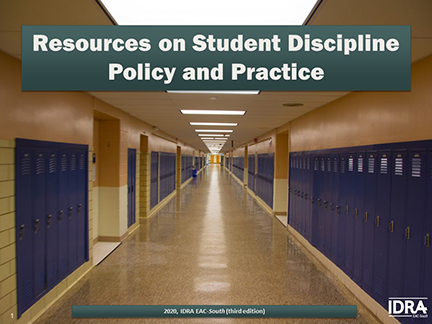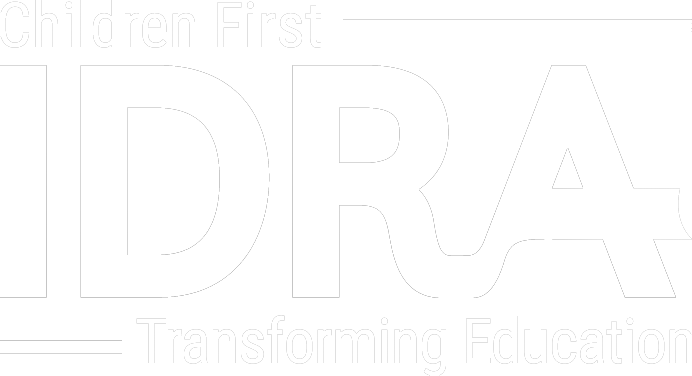• Morgan Craven, J.D., Nilka Avilés, Ed.D., & Aurelio M. Montemayor, M.Ed. • IDRA Newsletter • February 2020 •


 Positive cultures of teaching and learning support students’ attendance, academic achievement, engagement and positive self-concept. These cultures depend on effective discipline, which addresses challenging and unsafe behaviors constructively.
Positive cultures of teaching and learning support students’ attendance, academic achievement, engagement and positive self-concept. These cultures depend on effective discipline, which addresses challenging and unsafe behaviors constructively.
Unfortunately, data show the prevalent overuse of ineffective exclusionary discipline measures, such as suspensions and alternative school placements, in schools across the country. Students of color, students with disabilities, and LGBTQ students are more likely to be punished, even though they are not more likely to misbehave (Rumberger & Losen, 2016).
IDRA examined disciplinary referrals among students in the IDRA Valued Youth Partnership (VYP) program. The program identifies middle and high school students struggling in school and enlists them as tutors for elementary school students also facing challenges. By taking on a leadership role, the tutors develop self-esteem, confidence, and a greater sense of agency in their academic and social lives. Importantly, teachers and staff in schools also begin to view the students, and their potential for success, differently.
Our analysis of students in the program found that disciplinary referrals decreased by 14% among participating students from the previous year. The findings demonstrate the power of rethinking discipline. When school personnel changed their attitudes about students they originally saw as challenging and unmotivated, they opted to support them, rather than push them away. Results from the study also show that participating VYP students have increased academic performance, have better school attendance, and are more likely to advance to higher education. (IDRA, 2019)
Moving an entire school away from ineffective punitive discipline practices requires many shifts in culture, policy and practice. School and district teams must review data, examine and respond to inequities revealed by data, engage all adults, and support strong and authentic relationships between students and adults.
IDRA has worked with a number of school district teams who transformed their discipline policies and practices, often in partnership with a community task force or parent group. For schools in the southern United States, the IDRA EAC-South can guide at little or no cost school leaders through the process outlined below.
Examine Data and Policies through an Equity Lens
Examining data through an equity lens helps schools address harmful discipline policies and practices. Schools can do the following.
Collect and analyze disaggregated data regularly. Discipline data should be disaggregated by critical groupings and their intersections, such as race, gender, socioeconomic, special education and English learning status. It is important to understand how all groups of students are impacted in order to change policies and practices that may have a disproportionate and harmful effect.
Make data publicly available and easily accessible. Parents, students and other community members should be able to easily find and understand data so they can engage authentically with their schools.
Examining data through an equity lens helps schools address harmful discipline policies and practices.
Provide appropriate and useful context to understand the data. Related data sets, like academic performance, attendance, extracurricular participation and other school climate indicators, should be analyzed, in addition to discipline data. This information provides a more complete review that can lead to important systemic changes in schools.
Enact fair policies, practices and systems that are responsive to data. Data can reveal unfair and inappropriate discipline practices and policies. Schools and districts have a responsibility to change those policies and practices, and to foster campus climates that support all students. For example, if a dress code policy leads to the disproportionate suspension of Black girls, the school should change that policy. Or, if the data reveal that a particular educator is suspending significantly more students than any other educator, a school administrator should intervene to provide professional development and coaching.
Include All Adults in the Building
Every adult in a school has a role to play in maintaining a safe and positive culture. This includes administrators, teachers, counselors, librarians, custodians, bus drivers and other staff. No one should engage in harmful discipline practices.
Administrators, as school leaders, set the tone and articulate the plan for discipline in a school. To be equitable, discipline plans must be fair, consistently enforced, developmentally appropriate, sensitive to student and adult needs, and must prioritize safety.
Meaningful discipline systems are proactive, rather than reactive. To be proactive, school administrators can know and greet students by name and make personal connections with families. Schools can provide training on implicit bias to help teachers build relationships with students and address their own biases that may result in unfair discipline practices. All staff, from secretaries to cafeteria personnel, can actively engage in the supportive culture of a school.
Build Authentic Relationships with Students
Meaningful adult support changes students’ lives. IDRA conducted a study in a large urban school district and found that if at least one adult acts as mentor and counselor to a student, that student will complete high school (Robledo Montecel, et al., 1989). Effective discipline requires that adults understand the whole student and build the strong relationships that are the foundation of strong school cultures.
Sometimes schools discipline students for behaviors that really are age appropriate or for underlying issues that are out of students’ control. For example, preschoolers across the country are suspended or expelled for normal behaviors seen as “disruptive.” Or, students who are homeless and come to school stressed and hungry may be punished for behaviors that are simply a normal reaction to their difficult situation. These students should be supported, not punished or pushed away.
When adults in schools seek to understand students, they can support their needs and avoid harmful punishments. Gaining this understanding can require training and access to appropriate responses and supports. It is also critical that adults build strong relationships with students’ families to fully understand situations that may lead to challenging behaviors.
By examining school data and policies through an equity lens, involving all school staff, and actively knowing their students, school personnel can create a positive culture that is conducive to learning in each classroom and throughout the school campus.
Resources
Intercultural Development Research Association. (2019). IDRA Valued Youth Partnership program data, unpublished. San Antonio, Texas: IDRA.
Johnson, P.N., & Velázquez, J.A. (March 2019). “Three Approaches for Dismantling Discriminatory Discipline in Schools,” IDRA Newsletter.
Robledo Montecel, M., Cortez, A., & Penny-Velasquez, M. (1989). The Answer: Valuing Youth in Schools and Families: A Report on Hispanic Dropouts in the Dallas Independent School District. San Antonio, Texas: Intercultural Development Research Association.
Rumberger, R.W., & Losen, D.J. (2016). The High Cost of Harsh Discipline and Its Disparate Impact. Los Angeles, Calif.: Civil Rights Project.
![]() Morgan Craven, J.D., is the IDRA national director of policy, advocacy and community engagement. Comments and questions may be directed to her via email at morgan.craven@idra.org. Nilka Avilés, Ed.D., is an IDRA senior education associate and co-directs IDRA’s Re-Energize project. Comments and questions may be directed to her via email at nilka.aviles@idra.org. Aurelio M. Montemayor, M.Ed., is IDRA’s family engagement coordinator. Comments and questions may be directed to him via email at aurelio.montemayor@idra.org.
Morgan Craven, J.D., is the IDRA national director of policy, advocacy and community engagement. Comments and questions may be directed to her via email at morgan.craven@idra.org. Nilka Avilés, Ed.D., is an IDRA senior education associate and co-directs IDRA’s Re-Energize project. Comments and questions may be directed to her via email at nilka.aviles@idra.org. Aurelio M. Montemayor, M.Ed., is IDRA’s family engagement coordinator. Comments and questions may be directed to him via email at aurelio.montemayor@idra.org.
[©2020, IDRA. This article originally appeared in the February 2020 IDRA Newsletter by the Intercultural Development Research Association. Permission to reproduce this article is granted provided the article is reprinted in its entirety and proper credit is given to IDRA and the author.]



